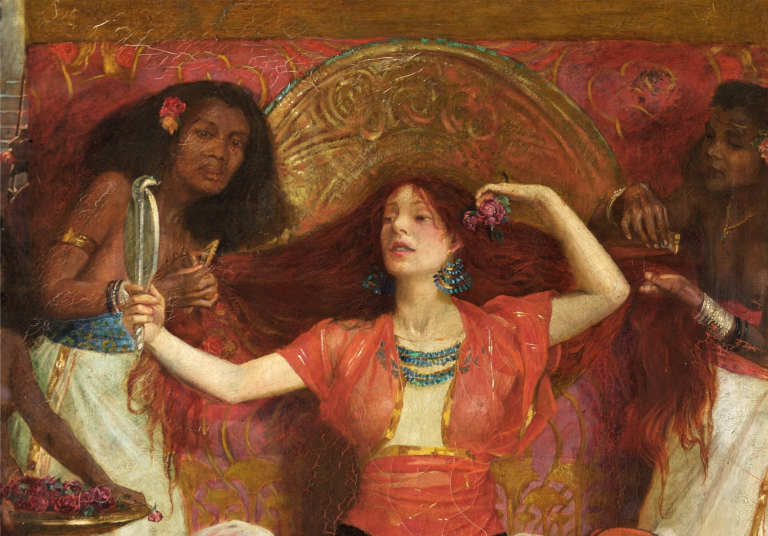Jezebel, a name that evokes images of treachery and evil, is one of the most infamous figures in the Bible.
Her story, chronicled in the books of 1 and 2 Kings, offers profound lessons about leadership, morality, and the consequences of idolatry.
This article takes a look at 15 key lessons from the life of Queen Jezebel, drawing insights from her actions and their impact.
Who was Jezebel in the Bible
Jezebel in the Bible was a queen of Israel, married to King Ahab, known for promoting the worship of Baal and persecuting the prophets of Yahweh.
Here, we will explain 15 lessons of Jezebel in the bible in more detail.
1. The Danger of Idolatry
Lesson: Jezebel’s introduction of Baal worship in Israel (1 Kings 16:31) serves as a stark reminder of the dangers of idolatry.
As the daughter of Ethbaal, king of the Sidonians, she brought with her the worship of Baal, a pagan god. Jezebel’s aggressive promotion of Baal worship, including building a temple for Baal in Samaria, led Israel astray.
This act of idolatry had devastating spiritual consequences for the nation. It highlighted the importance of steadfast devotion to God and the dangers of allowing foreign influences to corrupt pure worship.
The lesson here is the critical need for vigilance against idolatry and the unwavering commitment to worship the one true God.
2. The Influence of Marriage
Lesson: Jezebel’s marriage to King Ahab illustrates how a spouse’s influence can lead one away from righteousness. Ahab’s acceptance of her idolatrous practices shows the impact a partner can have on one’s spiritual direction.
Through this union, Jezebel introduced her pagan beliefs and practices into Israel, significantly influencing Ahab and the kingdom’s spiritual landscape.
The lesson here is the importance of choosing a spouse who shares and supports one’s faith and values, as a partner’s influence can either strengthen or undermine one’s spiritual integrity.
3. The Consequences of Manipulation
Lesson: Jezebel’s manipulation of King Ahab to secure Naboth’s vineyard (1 Kings 21:1-16) demonstrates the destructive power of deceit and manipulation.
Ahab coveted Naboth’s vineyard, and when Naboth refused to sell it, Jezebel orchestrated a plot to falsely accuse Naboth of blasphemy and treason, leading to his execution. She then handed the vineyard to Ahab.
This act of manipulation and injustice led to innocent bloodshed and divine judgment upon Ahab and Jezebel.
The lesson here is the destructive nature of deceit and the severe consequences of manipulating others for personal gain. It underscores the importance of integrity and justice in all dealings.
4. The Power of Evil Leadership
Lesson: As queen, Jezebel wielded her power to propagate evil. Her story warns of the far-reaching effects of corrupt leadership on a nation’s moral and spiritual fabric.
Jezebel used her position to enforce the worship of Baal, persecuting and killing the prophets of Yahweh. Her actions led Israel into deeper idolatry and moral decay.
The lesson here is the significant responsibility of leaders to promote righteousness and the profound impact of their influence on society’s values and behaviors.
5. The Cost of Persecution
Lesson: Jezebel’s persecution of God’s prophets (1 Kings 18:4) shows the cost of standing against truth. Her relentless pursuit of Elijah and other prophets underscores the hostility that true faith can face.
Jezebel’s actions forced prophets to hide in caves and live in constant fear for their lives. Despite this, prophets like Elijah stood firm, demonstrating the cost of faithfulness to God’s truth.
The lesson here is the courage required to stand for one’s faith in the face of persecution and the ultimate triumph of truth over evil.
6. The Role of Prophetic Confrontation
Lesson: Elijah’s bold confrontation with Jezebel (1 Kings 18:16-19) highlights the critical role of prophetic voices in challenging and condemning evil.
Elijah fearlessly confronted Ahab and Jezebel, calling out their sins and false worship. His courage to speak truth to power was instrumental in turning the hearts of the people back to God.
The lesson here is the necessity of courageous leaders who are willing to stand up against corruption and lead people back to righteousness.
7. The Inevitability of Divine Justice
Lesson: Jezebel’s eventual demise (2 Kings 9:30-37) illustrates the certainty of divine justice. Despite her power, she could not escape God’s judgment. Her gruesome death, prophesied by Elijah, served as a stark reminder that evil will not go unpunished.
The lesson here is the assurance that divine justice prevails and that those who commit evil acts will ultimately face consequences, reaffirming the importance of living a life of righteousness.
8. The Impact of Hereditary Evil
Lesson: Jezebel’s legacy continued through her daughter Athaliah, who also engaged in wickedness (2 Kings 11). This continuation of evil highlights how negative traits and behaviors can be passed down through generations.
Athaliah’s reign was marked by similar idolatry and violence, demonstrating the destructive legacy Jezebel left behind.
The lesson here is the critical role of parents in setting a godly example for their children and the potential generational impact of one’s actions and values.
9. The Significance of Righteous Remnants
Lesson: Despite Jezebel’s widespread influence, a remnant of faithful followers of God remained. This teaches that no matter how pervasive evil seems, there is always a remnant preserving the faith.
Elijah’s encounter with God, where he learned that 7,000 in Israel had not bowed to Baal, highlights the enduring presence of faithful believers.
The lesson here is the importance of maintaining faith and righteousness even in times of widespread apostasy and moral decay.
10. The Danger of False Religion
Lesson: Jezebel’s promotion of Baal and Asherah worship reveals the dangers of false religions that lead people away from the true God. Her zealous efforts to establish and maintain these cults caused immense spiritual damage to Israel.
The lesson here is the need for discernment and steadfastness in true worship, resisting the allure of false teachings that can lead individuals and nations astray.
11. The Power of Repentance
Lesson: Ahab’s brief moment of repentance after Naboth’s murder (1 Kings 21:27-29) shows that even in a context of great evil, repentance is powerful and can delay judgment.
This episode underscores God’s mercy and the importance of turning back to Him. Although Ahab’s repentance did not prevent the eventual downfall of his house, it demonstrates that genuine repentance can lead to mercy and a change in divine judgment.
The lesson here is the redemptive power of repentance and God’s willingness to forgive those who sincerely turn back to Him.
12. The Consequences of Unchecked Power
Lesson: Jezebel’s abuse of power serves as a cautionary tale about the corrupting influence of absolute authority. Her unchecked power led to numerous atrocities, including murder and widespread idolatry.
The lesson here is the necessity of accountability and checks and balances in leadership to prevent the abuse of power and to protect the welfare of the people.
13. The Role of Women in Leadership
Lesson: Jezebel’s influence and actions highlight the significant role women can play in leadership, for better or worse. Her story encourages the need for righteous and godly women leaders who can positively influence society.
While Jezebel’s leadership was marked by evil, it also shows that women have the potential to wield great influence and power.
The lesson here is the importance of nurturing and empowering women to lead with integrity, wisdom, and godliness.
14. The Ultimate Triumph of God’s Will
Lesson: Despite Jezebel’s efforts to control and dominate, God’s will ultimately prevail. Her downfall demonstrates that God’s plans cannot be thwarted by human schemes.
The lesson here is the assurance that no matter how powerful or entrenched evil appears to be, God’s purposes will ultimately be fulfilled. This provides hope and encouragement to remain faithful and trust in God’s sovereignty.
15. The Warning Against Spiritual Compromise
Lesson: Jezebel’s story is a powerful warning against spiritual compromise. Her integration of Baal worship with the worship of Yahweh led to widespread apostasy in Israel, teaching the importance of unwavering faithfulness to God.
The lesson here is the danger of diluting one’s faith by adopting or tolerating practices and beliefs contrary to God’s commands. It underscores the need for purity in worship and adherence to the truth.
Conclusion
Jezebel’s life serves as a potent reminder of the destructive power of idolatry, manipulation, and evil leadership.
Her story offers numerous lessons for individuals and leaders alike, emphasizing the importance of righteousness, integrity, and faithfulness to God.
By examining Jezebel’s actions and their consequences, we can gain deeper insights into the dangers of turning away from God and the ultimate triumph of divine justice.







